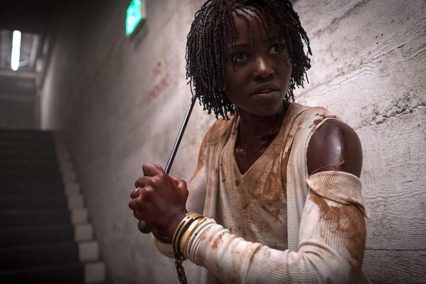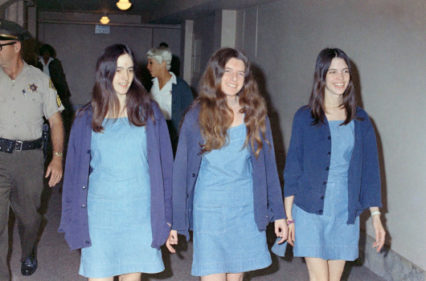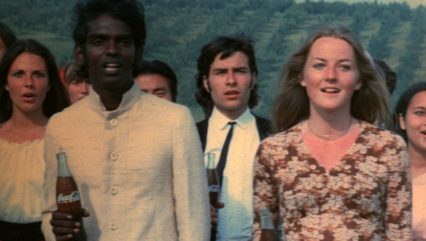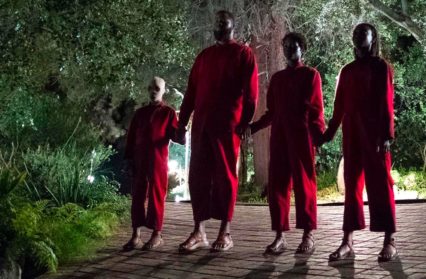Gary Raymond explores some of the symbolism in Jordan Peele’s new horror movie, Us, and how it speaks on a dark understanding of the wider American tragedy.
“We’re Americans,” says Adelaide’s monstrous doppelgänger in Jordan Peele’s Us. As signposts to metaphors go, this is a forty-foot neon one. Peele likes to telegraph in his symbolism as well. As if it wasn’t enough that the opening credits explain that there are “thousands of miles of tunnels” beneath America, the function of most lost to the mists of time, the opening shot is of a television set, in 1986, advertising an Earth Hour-type global gesture of hand-holding, the real life event of Hands Across America (more on this later). Next to the TV is a stack of VHS tapes at the periphery of the frame revealing a taste for eighties b-movie cinema with subterranean plots, including The Goonies (1985). But the most visible spine is for long-forgotten horror C.H.U.D. (1984), a movie about, you guessed it, zombie humanoids created by illicit government experiments that come out of the sewers and eat people. This is partly Peele’s language as a filmmaker, leaving Easter eggs all over the place, but it is also a sign that he has a great deal of fun when making his films, and he wants to viewer to have fun too.

As with Get Out, his Oscar-winning hit horror, Peele has a primary objective, and that is to make effective fast-paced jugular-gripping horror movies, but he also acutely understands that horror is and has been the genre that explores best the state of the nation. Get Out did this in the way it explored how America went from Obama to Trump, just in the same way nihilistic horror of the seventies was about the Vietnam, and slasher movies of the 80s were about the AIDS epidemic. And although Us is a little more flabby, a little more laden with other things, it sets out to do exactly what the extremely effective and trim Get Out did so well – give you a good time in the cinema.
The premise of the hook of Us is arguably even more inviting than that of Get Out – a middle class American family are awoken one night by a murderous unit of doppelgängers. Carnage, dark humour, and gradual slip and slide into apocalypse ensue. The eventual explanation behind all this is perhaps a little less satisfying, and Peele might have done better to let the “why” hit the cutting room floor and allow the “what the fuck” to linger in the memory after the lights go up. Luckily he is a filmmaker that knows what fun is, and after the croaked exposition of matriarch Adelaide’s doppelgänger, Red, we are treated to a sweeping symphony of violence played out to a rousing orchestral version of Luniz’s “I Got 5 On It”.
But the “why” of the exposition is where the tension of filmmaker and figurehead prove perhaps too much. In the end, the reason why Us doesn’t leave the impression of a great movie is because it feels like too much metaphor, and not enough punch.
Us is a movie very much about the American national psyche, and Peele is an intelligent enough reader of that psyche to know he has a beautifully outlandish idea to explore it with. But Us does not need such a neatly detailed conclusion as the one offered. There is enough in the shadows to get the viewer wherever they need to be. In other parts of the film, the spaces Peele leaves for the viewer to do the work are sometimes vast and always fairly satisfying. Entire theses could be written alone on the items used – and not used – to kill. This is an American home invasion horror at its basic model, and yet where are the guns? Home invasion is a propagandised American nightmare out of which the NRA have made billions of dollars, and yet not a single gun (apart from a flaccid flare pistol) appears in the movie. When Shahadi Wright Joseph’s Zora chooses a golf club to dispatch her neighbour’s doppelgängers we are left in no doubt that it is no accident the black teenager has picked up one of the great symbols of bloated white American aspirational mediocrity. When her little brother, Evan Alex’s Jason, at the same time picks up a heavy crystal ornament as his weapon, paired with his cute printed white tuxedo t-shirt, he looks just a little bit too much like someone accepting an award (an Oscar?) when he stoves in the head of one of the monsters for it to be a coincidence.

And this brings me to what I think is the crux of Peele’s thesis. Us is a movie about television, about movies, and most notably about Hollywood, how America has presented itself to itself, and the wider world, as something it is not, and he is suggesting that the cracks are beginning to show. Peele understands that show business, for a hundred years, has been America’s most effective weapon in its empire building. Japan resurrected itself after Hiroshima and Nagasaki, and the Hydra’s heads of uncountable regimes across the world continue to regrow in the aftermath of American military bluster, but you go to the streets of Saigon now and you’ll find kids on the street who dream of being Iron Man. American hegemony has little to do with the macho posturing of its military might, and everything to do with the propaganda of its showbiz reels. The two most striking images of Us take the viewer straight to two of the most important, and seemingly very different, clouds on the American national psyche: The Manson Family, and Coca Cola.
America has never gotten over the Tate murders. It ushered in the idea of the home invasion, and with it the idea that the “well off” were not safe from the beastly murderousness the media told them only really happened in the inner city. That the Manson killers were also not black has similarly helped ingrain the mystical place Manson has in the American psyche. As Sarah Marshall explains in her fantastic You’re Wrong About… podcast on the Satanic Panic, America has always “known” where the danger lies, that black people are bestial and “a threat”, that it is black people who are inherently evil, whereas white people are possessed by evil. The Tate murders have become as much part of the psyche of the nation as the Kennedy assassination and the Vietnam War.
That the attack was so senseless, and happened in Los Angeles, has obsessed Hollywood ever since, too, and for every movie or TV series that tackles Manson head on, there are fifty that use the murders as a template for exploitation. The home invasion horror has of course been explored in many countries, but never so viscerally, and frequently, as it has been in America. An American home invasion movie feels like picking at a scab. (In the UK, on the other hand, such films could often easily be categorised under the banner, “when holidays go bad”).
In America, home invasion movies have come to represent a particular middle-class fear that the wolves are never far from the door. 2019 marks 50 years since the Manson Family murders took place, and yet even a casual review of Hollywood’s home invasion horrors of the last ten years would betray an eerie loyalty to the central ingredients of that massacre. Leafy middle-class suburbs often besieged by a murderous band of deranged figures, often with a heavy lean in the direction of the cult. The Strangers (2008), You’re Next (2011), and The Invitation (2016), are just three superior thrillers that bare an uncomfortable connection to the murders in Benedict Canyon of 1969. The extremely successful Purge series of movies started off this way, too, albeit in a more urban environment. American home invasion movies all bear a terrifying nihilistic streak that warns of the fabrics of civilised society breaking apart. That is what America fears most, because, as Peele is arguing, America knows deep down that the very idea of “civilised society” is bullshit. Us is about that façade.
The mythology surrounding the Manson murders stands very well for the paranoid delusions of modern America, that every good law-abiding citizen has a dark day awaiting them. And that it was white-on-white crime too is important. It is no accident the head of the white family, Tim Heidecker’s Josh Tyler, chooses to listen to the Beach Boys just before his home is invaded, the only band ever to record a Charles Manson-penned song (Dennis Wilson was a friend of Manson). Peele is asking his compatriots whether they can be trusted to truly evaluate the paranoia, whether they can be honest about complicity, or whether actually they are all on a road to perdition, damned by their contributions to the failed and rotten American experiment. It is easy, and satisfying to read Us as an allegory for class warfare, but it is a much smarter and more important movie than that.

The second strand that is most powerful about the movie brings back to mind the greatest ending to a television series in history, that final scene of Mad Men. Don Draper, in “finding himself” at a kibbutz in northern California, in actual fact finds the inspiration for an ad campaign for Coca Cola. The viewer, who has followed through the series the generation of American war veterans as they drink and womanise their way to sculpting the American middle class, is then introduced to the launchpad for the American model of hegemony in the second half of the twentieth century. Coca Cola was about to dominate a new world of global corporations, and offer its same cocktail of corrosive capitalism to the planet with which it had conquered the homeland over the previous decades. In Mad Men that is all Draper, America’s 20th century übermensch, is worth, that homunculus of a gift to his children, the happy face of an evil corporation.
The 1971 advert that propelled Coca Cola on this journey to global dominance was the now iconic “Teach the World to Drink Coke” ad that bares a striking resemblance, and was influential to, the ads for Hands Across America, a celebrity-endorsed fundraising push in 1986 organised by USA for Africa, and the open salvo and threaded image of Us. There is no coincidence that Hands Across America shared much of the iconography of Coca Cola PR at the time – the drinks company was a major sponsor (as Kenny Rogers, of all people, explains here). The idea of the symbolism is that America is unified, that it is a family, and in these times when American is apparently more divided than it’s ever been (insert wink to camera), Peele is calling out the bullshit, making clear that even Hands Across America was part of a PR campaign for an evil multinational corporation that had exploited America and was by the 1980s terrorising developing nations. He is drawing attention to the fact that America operates in much the same way a cult does, and that sound of ringing in your ears is the lingering suspicion that the Coca Cola hilltop advert always felt a bit cult-y, that Hands Across America felt a bit cult-y, and that the red boiler suits of the doppelgängers has more of a hint of the iconic footage of the Manson Family post arrest, paraded in front of news cameras in their prison garb.
And that is the America Jordan Peele wishes to unveil, one that is well and truly screwed. The doppelgängers who rise from the inverted wonderland of below do not seek to create a new world, but they seek to live the lives of their “tethered” other selves. The point is that America is a façade, and when Red says “We’re Americans” it is a tragic admission of aspiration, not revolution. Peele’s movie, for all its fun, its jokes and macabre theatrics, states that America is irredeemably lost. That is the stuff of true horror movies.
Us is on general release in cinemas now.
You might also like…
Hayley Long looks at the power and poignancy of Mrs America, the new star-studded BBC drama that tells the story of the efforts to ratify the Equal Rights Amendment in America in the 1970s and 80s, and how it tells many truths of the state of the nation, and its politics, today.



 Enjoyed this article? Support our writers directly by buying them a coffee and clicking this link.
Enjoyed this article? Support our writers directly by buying them a coffee and clicking this link.








